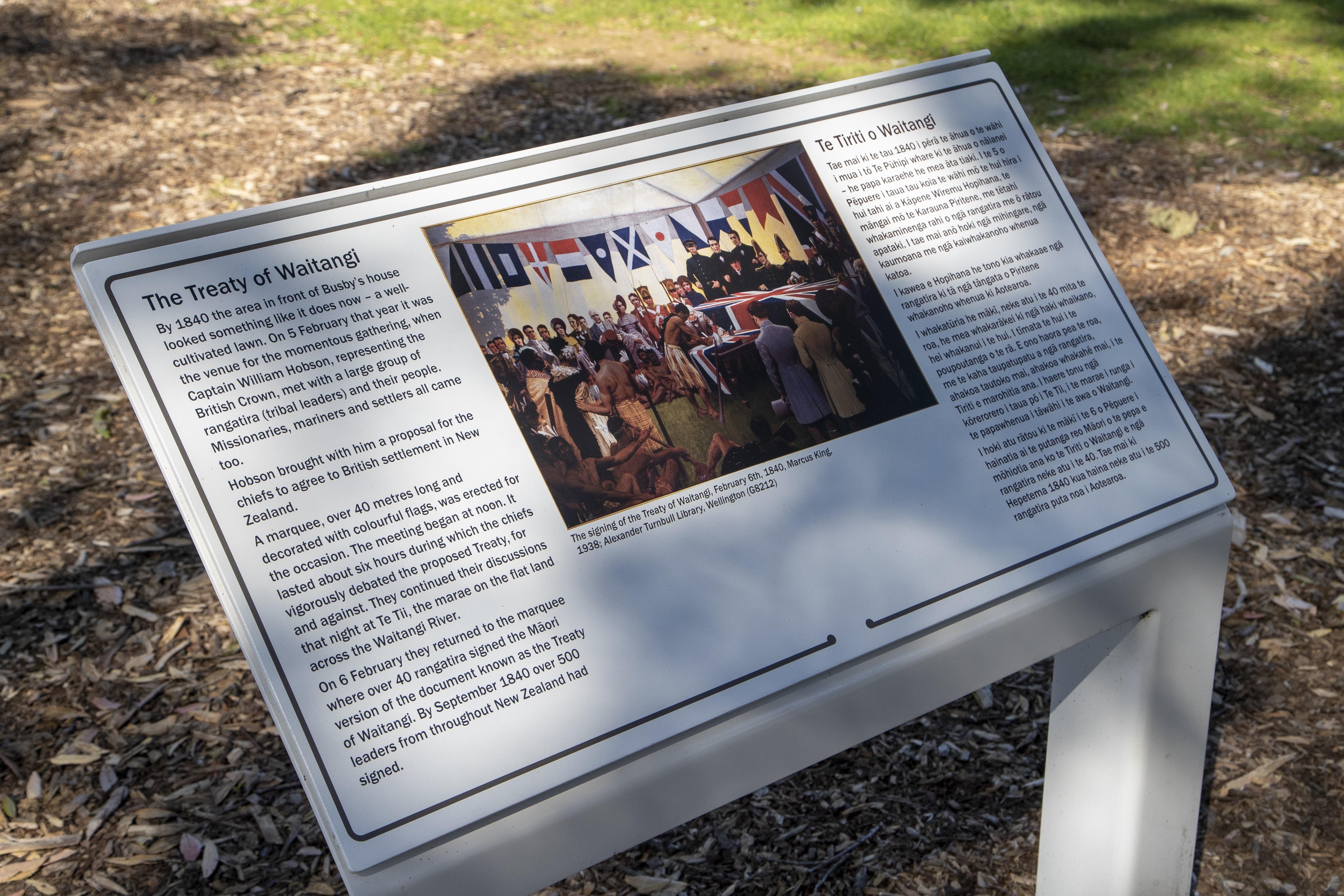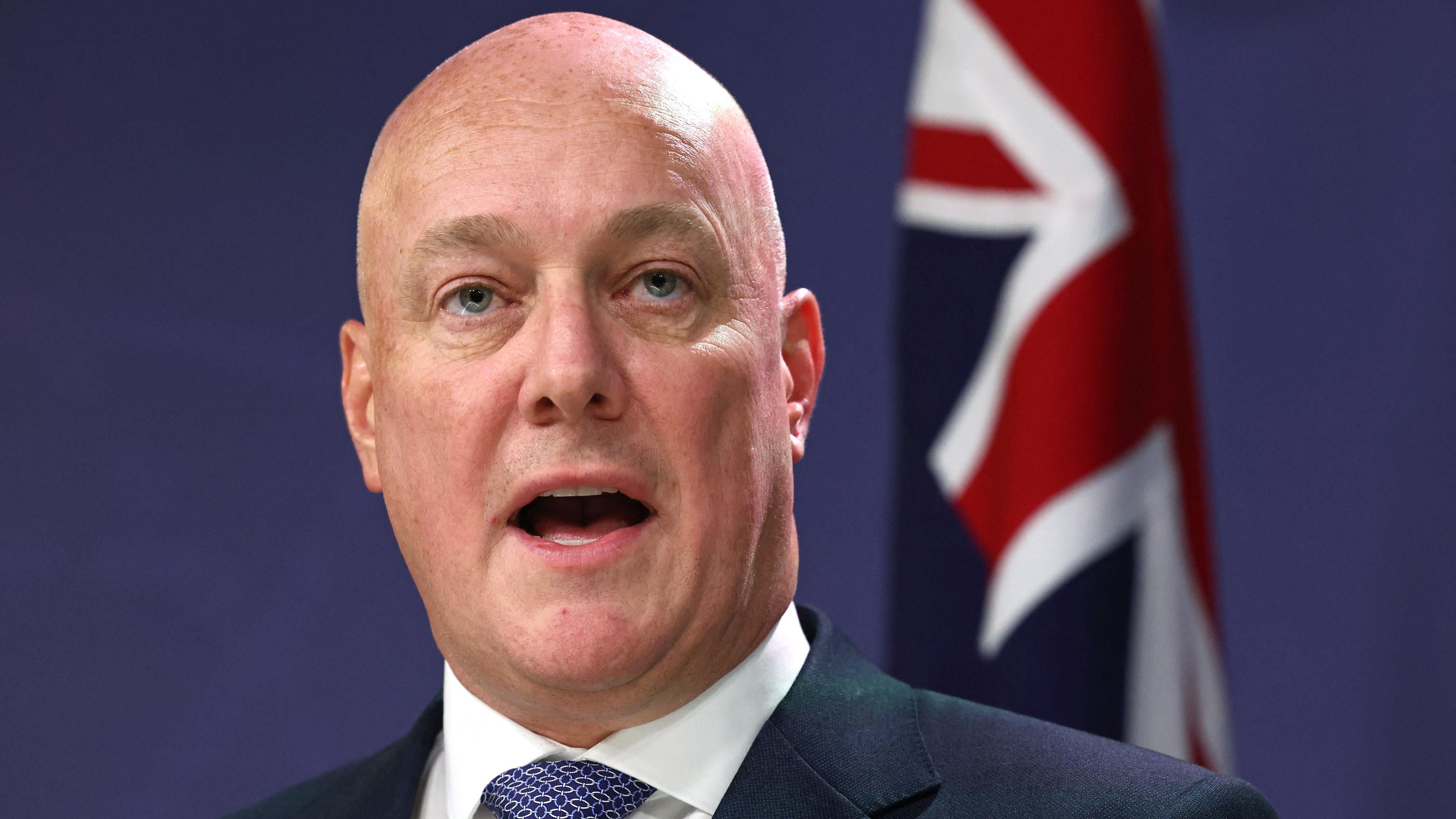 A sign on the Waitangi Treaty Grounds where the Treaty of Waitangi was first signed between Maori and the British Crown on Feb 6, 1840, detailing the history, is seen in Waitangi, northern New Zealand on Oct 5, 2020. (PHOTO / AP)
A sign on the Waitangi Treaty Grounds where the Treaty of Waitangi was first signed between Maori and the British Crown on Feb 6, 1840, detailing the history, is seen in Waitangi, northern New Zealand on Oct 5, 2020. (PHOTO / AP)
New Zealand has often been looked up to as a country where indigenous and non-indigenous people got along well. One of the reasons for that was the Treaty of Waitangi, signed in 1840, between representatives of the British Crown and 540 indigenous chiefs.
It was not a perfect document, but a treaty which gave the Maori people a voice in determining their future and a degree of autonomy.
For 184 years the treaty has stood the test of time.
All that is starting to change as the new three-party coalition government under Prime Minister Christopher Luxon plans to “review” the treaty.
The move by the government has angered New Zealand’s Maori people and many non-Maori people alike, who see it as being “racist” and anti-Maori.
ALSO READ: NZ Maori to discuss plans to row back on pro-Indigenous policies
Around the country, there has been widespread protests which are expected to culminate on Feb 6 when New Zealanders gather to celebrate Waitangi Day – the day the treaty was signed.
Co-leader of Te Pati Maori (The Maori Party) Debbie Ngarewa-Packer told the ABC recently that Maori leaders will “continue to grow the resistance”
The treaty is a statement of principles on which the British Crown and Maori people made a political compact to found a nation-state and build a government in New Zealand.
The document has three articles. In the English version, Maori ceded the sovereignty of New Zealand to Britain; Maori gave the Crown an exclusive right to buy lands they wish to sell, and, in return, are guaranteed full rights of ownership of their lands, forests, fisheries and other possessions; and Maori are given the rights and privileges of British subjects.
Now, it would appear, the government wants to rewrite the principles of the treaty.
Recently the Maori King, Te Arikinui Tuheitia Paki, held the first national hui – the meeting of Maori people – in a decade to discuss the government's agenda.
ALSO READ: NZ's swing right on Maori issues reveals new fault lines
Margaret Mutu, professor of Maori Studies at the University of Auckland, said the Treaty of Waitangi, which the Maori people call Te Tiriti o Waitangi is a “sacred covenant between Maori leaders and the (then) Queen of England”.
“It sets out the conditions under which British subjects could immigrate to New Zealand. It is a treaty of peace and friendship between Maori leaders and the Queen,” she told China Daily.
“Te Tiriti recognized that the Maori held ultimate and paramount power and authority (sovereignty) over the country including ourselves, our laws, our lands, all our resources and everything we valued.”
 New Zealand's Prime Minister Christopher Luxon reacts as he speaks during a press conference in Sydney on Dec 20, 2023. (PHOTO / AFP)
New Zealand's Prime Minister Christopher Luxon reacts as he speaks during a press conference in Sydney on Dec 20, 2023. (PHOTO / AFP)
The treaty delegated to Queen Victoria of England “permission to control her subjects who had already arrived and others to come, wherever they lived in New Zealand, using a controlling mechanism the missionaries called kawanatanga”, Mutu said.
READ MORE: NZ Maori lawmakers protest King Charles at parliament's opening
Co-leader of Te Pati Maori (The Maori Party) Debbie Ngarewa-Packer told the ABC recently that Maori leaders will “continue to grow the resistance”.
International law gives priority to the version signed by the indigenous people, but that is not something that the present government appears prepared to accept.
Richard Shaw, Professor of politics at Massey University
“I think it's a humiliating state for this government to be in when the rest of the world can see that there are strong accusations coming from Maori,” she said.
“They are being called an anti-Maori government, they're being called out as practicing white supremacy in how they're trying to diminish our Maori language, (and) how they're trying to diminish initiatives that help us to stay alive.”
Richard Shaw, professor of politics at Massey University, said the background to the current dispute is a proposal by the ACT, which is one of the coalition partners in the new government, to introduce a treaty principles bill.
“The intention … is to statutorily define the principles of the Treaty of Waitangi,” he told China Daily.
READ MORE: New NZ govt eyes central bank remit, Indigenous policies, tax
Grant Duncan, an independent political scientist based in Auckland, said one of the conditions of the ACT joining the National Party in forming a government “included an agreement to introduce a bill that states what the principles are”.
“The National have made no commitment to support the bill beyond the select committee stage,” he told China Daily.
He said it was not correct to say the government is trying to change anything in the Treaty.
Massey University’s Shaw said: “This is a very old debate, which we have been having in this country for decades now.
“Historically we have left to the courts to determine and to interpret the meaning of the treaty, and 40 years ago they settled upon a principles-based approach, which was intended to leave things open-ended and to provide for flexibility within the executive branch in particular.”
ALSO READ: NZ scraps bill allowing 16-year-olds to vote in local body polls
Shaw said, the reason ACT wants to address this issue is “because of the support it will receive from a reactionary section on the voting public”.
Part of the debate stems from the fact that there are two versions – one written in English and the other written in the language of the indigenous people.
“International law gives priority to the version signed by the indigenous people, but that is not something that the present government appears prepared to accept,” Shaw said.


